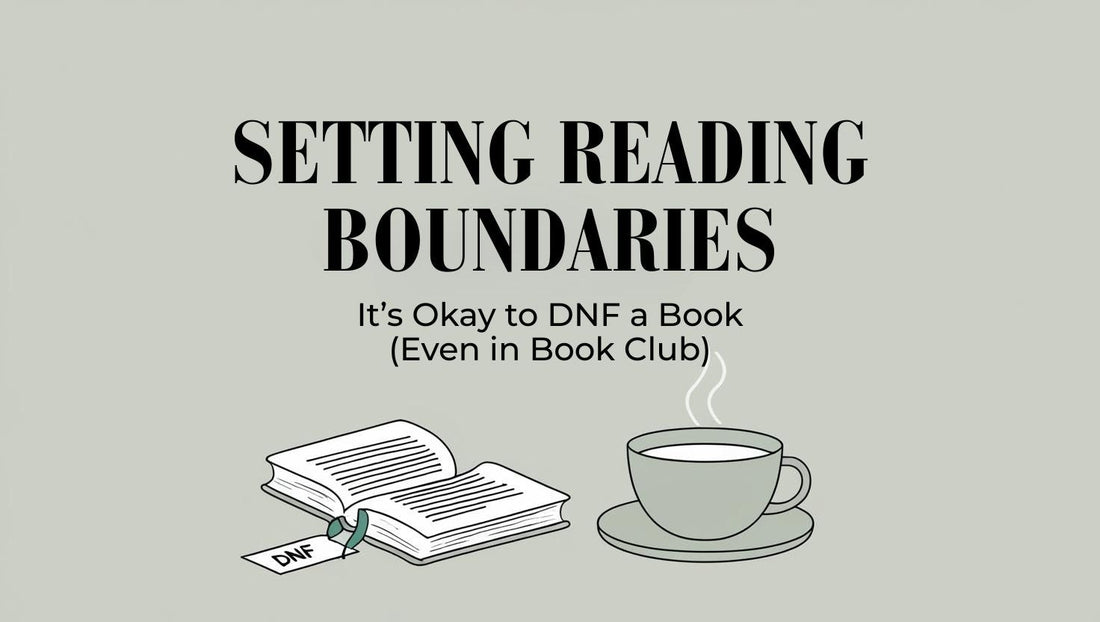
Setting Reading Boundaries: It’s Okay to DNF a Book (Even in Book Club)
Table of content
- 1. Key Takeaways
- 2. What Does It Mean to DNF a Book?
- 3. You Don’t Owe Every Book a Finish Line
- 4. How to Talk About DNFing in Your Book Club
- 5. Books Are Not Tests — They’re Experiences
- 6. Setting Your Own DNF Rules (Without the Guilt Trip)
- 7. What to Do If Your Book Club Book Is a Miss
- 8. Books to DNF and Still Talk About: Examples
Key Takeaways
- DNF stands for Did Not Finish and it's okay to stop reading a book that isn’t working for you.
- Forcing yourself to finish a book can lead to reading slumps or burnout.
- You can skip a book and still participate in a book club discussion.
- Setting personal DNF rules can help reduce guilt and increase reading enjoyment.
- Talking about why you DNFed a book can open up meaningful discussions with others.
What Does It Mean to DNF a Book?
To DNF a book simply means you decided to stop reading it before the end. “DNF” stands for Did Not Finish. You didn’t fail. You just made a choice.
You might DNF a book because:
- The plot is dragging.
- The writing style doesn’t click.
- It doesn’t fit your current mood.
- You're not interested in the topic anymore.
The term became popular in online reading spaces like Goodreads, Reddit, and BookTube. It gives readers a way to track books they quit without feeling guilty. Check out Lifehacker’s guide to quitting books guilt-free for more perspective.
You Don’t Owe Every Book a Finish Line
Many of us were raised to “finish what you start,” but that doesn’t always apply to books. You don’t owe your time to a story that doesn’t hold your interest.
Here’s why:
- Reading should be enjoyable, not stressful.
- Your free time is limited — protect it.
- Forcing a bad fit can make you dread picking up any book.
Books aren’t chores. They’re supposed to bring joy, not frustration.📖 Need help making room for more enjoyable reads? See How to Find Time for Daily Reading in a Busy Life.
How to Talk About DNFing in Your Book Club
Not finishing a book club pick can feel awkward — but it doesn’t have to be. You can still show up and contribute.
You might say:
- “I stopped at chapter 6. It wasn’t clicking, but I’d love to hear what changed for you.”
- “The writing style didn’t work for me, but I’m curious about how the story developed.”
Let others know it’s not personal — it’s just about taste. Your comments might help others feel more open, too.💬 Use these 5 Questions to Spark Engaging Book Club Discussions even if you didn’t finish the book.
Books Are Not Tests — They’re Experiences
Books don’t have to be finished to be appreciated. You don’t get a reward for powering through a book you dislike.
Here’s what your DNF list might reveal:
- Which genres you’re not enjoying anymore.
- Whether your reading mood has changed.
- That you don’t like certain writing styles.
Understanding this helps you pick better books in the future.👓 To explore your preferences more, try Which Reading Method Suits You Best?
Setting Your Own DNF Rules (Without the Guilt Trip)
There’s no rulebook that says how far into a book you need to read before quitting. But creating your own personal system can help.
Popular DNF methods include:
- The 50-page rule — If you're not into it by page 50, let it go.
- Three chapters test — Still not invested after three chapters? Close the book.
- Mood-based quitting — If you’re forcing it, stop and try again later.
Want to be more intentional about what you read? See How to Achieve Your 2025 Reading Goals
What to Do If Your Book Club Book Is a Miss
Just because you didn’t finish the book doesn’t mean you can’t join the meeting.
You can:
- Ask questions about parts you didn’t get to.
- Share why you stopped.
- Suggest alternatives or similar reads you liked better.
Try hosting a “DNF confession night” where everyone shares one book they couldn’t finish and why.
Books to DNF and Still Talk About: Examples
Some books are infamous for being tough to finish — but they still spark great conversations.
Here’s a few:
| Book Title | Genre | Common DNF Reason | Still Worth Discussing Because... |
| Ulysses by James Joyce | Literary | Complex structure | Language and stream-of-consciousness style |
| Moby Dick by Herman Melville | Classic | Slow pacing | Symbolism, obsession, nature |
| Infinite Jest by David Foster Wallace | Literary/Postmodern | Dense and nonlinear | Cultural critique and humor |
| The Goldfinch by Donna Tartt | Contemporary | Long and detailed | Deep character exploration |
🌐 Bustle’s list of books people DNF is a good place to compare notes.
Is it okay to DNF a book club pick?
Yes. You can still participate in the meeting and share why it didn’t work for you.
How do I avoid sounding negative when I explain why I quit?
Focus on your preferences, not the book’s flaws. Say “This wasn’t a match for me,” rather than “It was boring.”
Should I log DNFed books in my reading journal or app?
Definitely. DNFing is part of your reading journey. Log it and maybe revisit later.
What if I feel like I'm quitting too many books?
Use that as a guide — maybe you need to adjust your picks or explore new genres.







